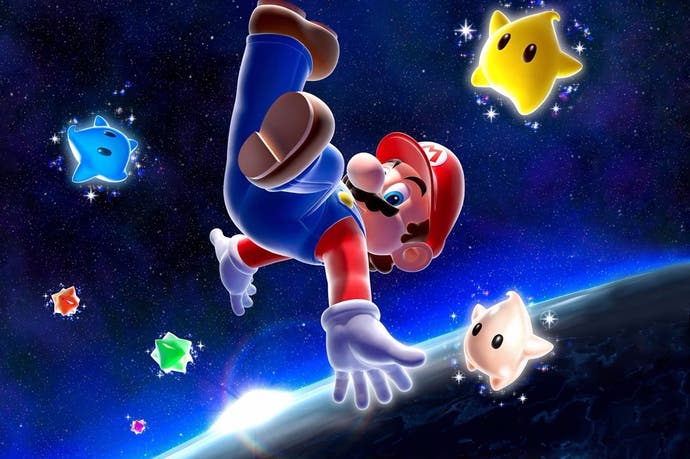Super Mario Galaxy, the Nintendo game that landed from another star
Only in dreams.
It's only natural that a game set in the heavens would feel like something that's landed from a distant planet. Super Mario Galaxy, Tokyo EAD's dizzying spin on the Nintendo mascot's mainline series, is renowned for many things: for being a highlight of the Wii's catalogue, the follow-up to Super Mario 64 that particular trailblazer deserved and for being the very best of its generation. Yet, coming up to a whole ten years since it first launched, the whole thing still feels like a dream.
Of course the Mushroom Kingdom has always felt like a colourful slice of slumberland, with its chatty toadstools, weaponised turtles and candy cane countryside. Galaxy, though, goes a step beyond - here's a video game that doubles down on the reveries of the semi-conscious, in which falling can feel as fantastic as flying as you place yourself at the whim of this game's own eccentric gravity. In Super Mario Galaxy, the chasms you may well have avoided in other platform games beg to be leaped into, just so you might see where they take you next.
Super Mario Galaxy 2 might put up the sterner challenge and may well be the better game, but I'll take its predecessor any day for the coherence of its own particular dream world. The hub world ties its disparate planets together, the soaring, beautiful soundtrack stirs the soul as does the storybook - a gently melancholic tale of how the enchantress Rosalina made her way to the stars - which slowly unfurls throughout the adventure. It all comes together to create a richly emotive Mario game.
Put that down, in no small part, to director Yoshiaki Koizumi, a man who got his break by weaving a now beloved dream. Koizumi made his name at Nintendo when he was drafted in to write the manual for Link's Awakening, and upon finding there wasn't much there to work with let his imagination fill in the bountiful space he'd been left; the dream world, the concept and the island were all his doing. Super Mario Galaxy, somewhat surprisingly only Tokyo EAD's second project after the deliciously unorthodox Donkey Kong Jungle Beat, was also infused with that same wistful magic. Koizumi revelled in sneaking story into Mario; at night after work had finished, Koizumi would stay late to personally draft the storybook himself until it was ready to present to his mentor, Shigeru Miyamoto.
The results are spectacular, and as surprising - in their own way - as Super Mario 64 before it. There's a cruelty to how the Mario game between those two - the quirky, lopsided but still loveable Super Mario Sunshine - has been written off as an odd offshoot, though while that game deserves its own plaudits there's no doubting which is the true successor to 64. There's the simple fact that Galaxy's genesis, and the idea of spherical worlds, came from the Mario 128 demo at SpaceWorld 2000 - and then there's its incredible ability to awe the player with new ideas at every turn.
Super Mario Odyssey, of course, looks like it'll match the open sandbox design of 64 with the sheer inventiveness of Galaxy, but will it match its brilliant ambiance and style? Not long to find out, but no matter where Odyssey lands in the pantheon of Mario greats, I'll always have soft spot for this, a strange and wonderful game beamed in from another star.


